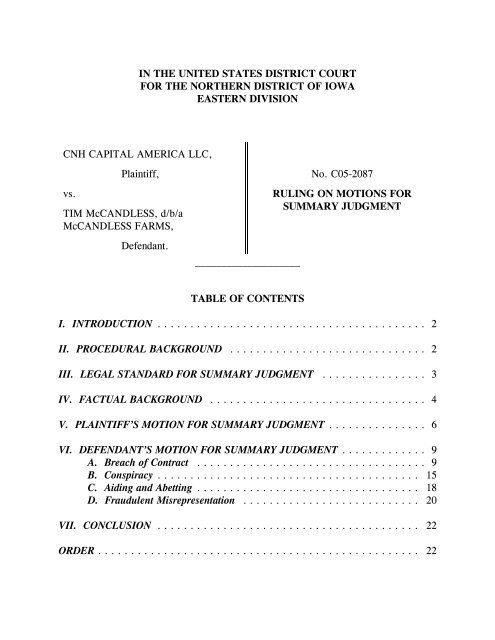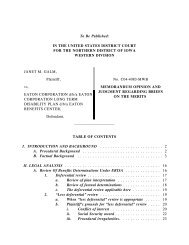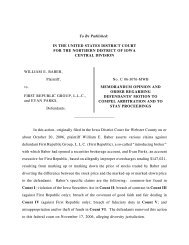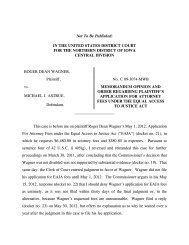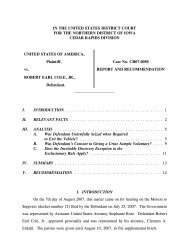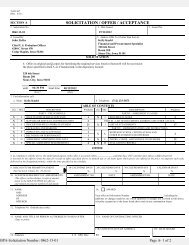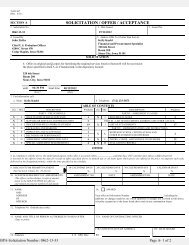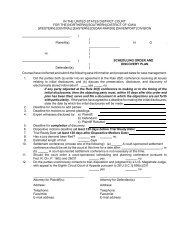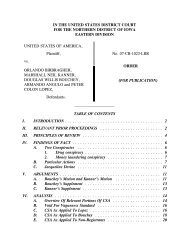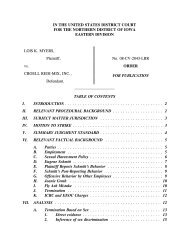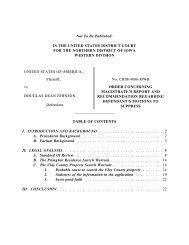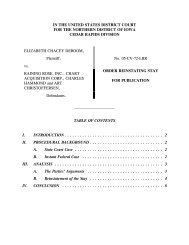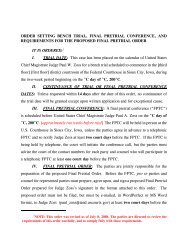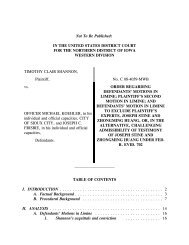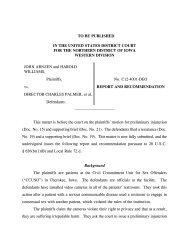C:\Documents and Settings\sey\Desktop\JSS OPINIONS\JSS-05-CV ...
C:\Documents and Settings\sey\Desktop\JSS OPINIONS\JSS-05-CV ...
C:\Documents and Settings\sey\Desktop\JSS OPINIONS\JSS-05-CV ...
You also want an ePaper? Increase the reach of your titles
YUMPU automatically turns print PDFs into web optimized ePapers that Google loves.
IN THE UNITED STATES DISTRICT COURT<br />
FOR THE NORTHERN DISTRICT OF IOWA<br />
EASTERN DIVISION<br />
CNH CAPITAL AMERICA LLC,<br />
Plaintiff, No. C<strong>05</strong>-2087<br />
vs.<br />
TIM McCANDLESS, d/b/a<br />
McCANDLESS FARMS,<br />
Defendant.<br />
____________________<br />
RULING ON MOTIONS FOR<br />
SUMMARY JUDGMENT<br />
TABLE OF CONTENTS<br />
I. INTRODUCTION ......................................... 2<br />
II. PROCEDURAL BACKGROUND .............................. 2<br />
III. LEGAL STANDARD FOR SUMMARY JUDGMENT ................ 3<br />
IV. FACTUAL BACKGROUND ................................. 4<br />
V. PLAINTIFF’S MOTION FOR SUMMARY JUDGMENT ............... 6<br />
VI. DEFENDANT’S MOTION FOR SUMMARY JUDGMENT ............. 9<br />
A. Breach of Contract ................................... 9<br />
B. Conspiracy ........................................ 15<br />
C. Aiding <strong>and</strong> Abetting .................................. 18<br />
D. Fraudulent Misrepresentation ........................... 20<br />
VII. CONCLUSION ........................................ 22<br />
ORDER ................................................. 22
I. INTRODUCTION<br />
On the 1st day of May, 2007, this matter came on for telephonic hearing on the<br />
Motion for Summary Judgment on Count III of Defendant’s Counterclaims (docket<br />
number 20) filed by Plaintiff on December 22, 2006, <strong>and</strong> on the Motion for Summary<br />
Judgment (docket number 31) filed by Defendant on March 14, 2007. Plaintiff appeared<br />
by its attorneys, Scott Long <strong>and</strong> Sean P. Moore. Defendant appeared by his attorney,<br />
William W. Graham.<br />
II. PROCEDURAL BACKGROUND<br />
On December 21, 20<strong>05</strong>, Plaintiff CNH Capital America LLC filed a Complaint<br />
against Defendant Tim McC<strong>and</strong>less, d/b/a McC<strong>and</strong>less Farms. In its Complaint, Plaintiff<br />
alleged one count of breach of contract based on Defendant’s failure to pay the amounts<br />
due under nine retail installment contracts. On April 4, 2006, Plaintiff filed its First<br />
Amended Complaint, which added three additional counts against Defendant. Plaintiff’s<br />
additional allegations are: conspiracy (Count II), aiding <strong>and</strong> abetting (Count III), <strong>and</strong><br />
fraudulent misrepresentation (Count IV).<br />
On May 1, 2006, Defendant filed his Answer, Affirmative Defenses, Counterclaim<br />
<strong>and</strong> Jury Dem<strong>and</strong>. In his Counterclaim, Defendant alleges three counts: aiding <strong>and</strong><br />
abetting (Count I), breach of the covenant of good faith <strong>and</strong> fair dealing (Count II), <strong>and</strong><br />
abuse of process (Count III). On May 19, 2006, Plaintiff filed a Motion to Dismiss<br />
Counterclaims for Failure to State a Claim Upon Which Relief Can Be Granted. On<br />
August 9, 2006, the Court entered an Order granting Plaintiff’s motion to dismiss on<br />
Counts I <strong>and</strong> II <strong>and</strong> denying its motion on Count III of Defendant’s Counterclaim.<br />
Plaintiff filed its instant summary judgment motion on December 22, 2006, asking<br />
the Court to summarily dismiss the remaining count of Defendant’s counterclaim. On<br />
March 14, 2007, Defendant filed a Resistance to Plaintiff’s motion, <strong>and</strong> also filed his own<br />
motion for summary judgment, requesting that Plaintiff’s Complaint be summarily<br />
2
dismissed. On April 16, 2007, Plaintiff filed a Reply <strong>and</strong> Resistance. On April 26, 2007,<br />
Defendant filed a Reply.<br />
III. LEGAL STANDARD FOR SUMMARY JUDGMENT<br />
Summary judgment is appropriate if the record shows that “there is no genuine issue<br />
as to any material fact <strong>and</strong> that the moving party is entitled to a judgment as a matter of<br />
law.” FED. R. CIV. P. 56(c). “An issue of fact is genuine when ‘a reasonable jury could<br />
return a verdict for the nonmoving party.’” Friends of Boundary Waters Wilderness v.<br />
Bosworth, 437 F.3d 815, 821 (8th Cir. 2006) (quoting Anderson v. Liberty Lobby, Inc.,<br />
477 U.S. 242, 248 (1986)). A fact is a “material fact” when it “might affect the outcome<br />
of the suit under the governing law. . . .” Anderson, 477 U.S. at 248. The court must<br />
view the record in the light most favorable to the nonmoving party <strong>and</strong> afford it all<br />
reasonable inferences. Baer Gallery, Inc. v. Citizen’s Scholarship Foundation of America,<br />
Inc., 450 F.3d 816, 820 (8th Cir. 2006) (citing Drake ex rel. Cotton v. Koss, 445 F.3d<br />
1038, 1042 (8th Cir. 2006)).<br />
Procedurally, the moving party bears the initial responsibility of informing the court<br />
of the basis for its motion, <strong>and</strong> must identify those portions of the record which it contends<br />
show a lack of a genuine issue of material fact. Heisler v. Metropolitan Council, 339 F.3d<br />
622, 631 (8th Cir. 2003) (citing Celotex Corp. v. Catrett, 477 U.S. 317, 323 (1986)); see<br />
also Hartnagel v. Norman, 953 F.2d 394, 395 (8th Cir. 1992) (same). Once the moving<br />
party has successfully carried its burden under Rule 56(c), the nonmoving party has an<br />
affirmative burden to go beyond the pleadings <strong>and</strong> by depositions, affidavits, or otherwise,<br />
designate “specific facts showing that there is a genuine issue for trial.” FED. R. CIV. P.<br />
56(e); see, e.g., Baum v. Helget Gas Products, Inc., 440 F.3d 1019, 1022 (8th Cir. 2006)<br />
(“Summary judgment is not appropriate if the non-moving party can set forth specific<br />
facts, by affidavit, deposition, or other evidence, showing a genuine issue for trial.”). The<br />
nonmoving party must offer proof “such that a reasonable jury could return a verdict for<br />
the nonmoving party.” Anderson, 477 U.S. at 248. “‘Evidence, not contentions, avoids<br />
3
summary judgment.’” Reasonover v. St. Louis County, Mo., 447 F.3d 569, 578 (8th Cir.<br />
2006) (quoting Mayer v. Nextel W. Corp., 318 F.3d 803, 809 (8th Cir. 2003)).<br />
IV. FACTUAL BACKGROUND<br />
Beginning in July 2002, nine retail installment contracts were executed for farm<br />
equipment separately purchased from Walterman Implement, Inc. Each of these contracts<br />
contained the name <strong>and</strong> address of Defendant as the “buyer” <strong>and</strong> a signature indicating<br />
Defendant accepted the terms of the contract. 1 The nine retail installment contracts were<br />
subsequently assigned to Plaintiff.<br />
Defendant denies signing any of the retail installment contracts. Defendant further<br />
denies purchasing or authorizing anyone to purchase any of the farm equipment listed on<br />
the retail installment contracts. Defendant asserts that he did not become aware of the<br />
contracts until after this litigation had been commenced.<br />
1 The nine retail installment contracts included:<br />
(1) Contract dated July 10, 2002 for the purchase of a Case IH Tractor,<br />
serial number JEE0099007;<br />
(2) Contract dated June 17, 2003 for the purchase of a Case IH Tractor,<br />
serial number JAZ126881;<br />
(3) Contract dated October 8, 2003 for the purchase of a Case IH Corn<br />
Head, serial number HAJ034508;<br />
(4) Contract dated April 30, 2004 for the purchase of a Case IH Tractor,<br />
serial number JEE0098241;<br />
(5) Contract dated September 16, 2004 for the purchase of a Case IH<br />
Platform, serial number JJC0333064;<br />
(6) Contract dated December 1, 2004 for the purchase of a Case IH<br />
Combine, serial number JJC0196175;<br />
(7) Contract date April 22, 20<strong>05</strong> for the purchase of a Case IH Platform,<br />
serial number JJC0329990 <strong>and</strong> a Case IH Corn Head, serial number<br />
JJC0244525;<br />
(8) Contract dated May 23, 20<strong>05</strong> for the purchase of a Case IH Tractor,<br />
serial number JEE01029640; <strong>and</strong><br />
(9) Contracted dated June 8, 20<strong>05</strong> for the purchase of a Case IH<br />
Combine, serial number HAJ292707.<br />
4
However, Plaintiff received payments from Defendant on the retail installment<br />
contracts. Plaintiff also sent Defendant numerous correspondence regarding the contracts<br />
to his home address in 2004 <strong>and</strong> 20<strong>05</strong>. 2 Defendant claims that his bookkeeper, Joyce<br />
Block, made the payments on the retail installment contracts without his knowledge.<br />
Defendant also maintains that his wife sorts through any mail sent to their home.<br />
Defendant asserts that his wife would have given any correspondence sent from Plaintiff<br />
to Joyce Block in order for her to take care of it.<br />
Plaintiff claims that Defendant is currently in default under the terms of the retail<br />
installment contracts. 3 Specifically, Plaintiff asserts that Defendant has failed to make<br />
timely payments <strong>and</strong> failed to maintain the equipment/collateral secured by the retail<br />
installment contracts at the location identified in the contracts. Other facts that are<br />
significant for making the determinations on the motions for summary judgment will be<br />
discussed, as necessary, in the Court’s consideration of the legal issues presented.<br />
2 The record contains correspondence sent from Plaintiff to Defendant at his home<br />
on: May 6, 2004, June 14, 2004, July 21, 2004, August 20, 2004, November 1, 2004,<br />
November 4, 2004, December 1, 2004, December 14, 2004, January 3, 20<strong>05</strong>, March 1,<br />
20<strong>05</strong>, April 4, 20<strong>05</strong>, May 2, 20<strong>05</strong>, May 5, 20<strong>05</strong>, May 18, 20<strong>05</strong>, June 12, 20<strong>05</strong>, June 14,<br />
20<strong>05</strong>, June 19, 20<strong>05</strong>, August 1, 20<strong>05</strong>, <strong>and</strong> September 1, 20<strong>05</strong>.<br />
3 According to Plaintiff, as of December 1, 20<strong>05</strong>, the following outst<strong>and</strong>ing<br />
balances on the nine retail installment contracts are owed by Defendant:<br />
(1) $37,611.62 on the July 10, 2002 contract.<br />
(2) $55,110.37 on the June 17, 2003 contract.<br />
(3) $23,434,93 on the October 8, 2003 contract.<br />
(4) $82,683.35 on the April 30, 2004 contract.<br />
(5) $17,468.31 on the September 10, 2004 contract.<br />
(6) $72,129.14 on the December 1, 2004 contract.<br />
(7) $29,361.53 on the April 22, 20<strong>05</strong> contract.<br />
(8) $144,840.<strong>05</strong> on the May 23, 20<strong>05</strong> contract.<br />
(9) $141,923.97 on the June 8, 20<strong>05</strong> contract.<br />
5
V. PLAINTIFF’S MOTION FOR SUMMARY JUDGMENT<br />
In Count III of his Counterclaim, Defendant claims that Plaintiff’s “initiation of this<br />
litigation” constitutes abuse of process. Plaintiff argues that it is entitled to summary<br />
judgment on this Count because Defendant has failed to present facts which would<br />
constitute abuse of process. According to Plaintiff, it merely utilized the legal process as<br />
it was intended, <strong>and</strong> filed its Complaint <strong>and</strong> First Amended Complaint against Defendant<br />
because it believes he is liable for the amounts due on the nine retail installment contracts.<br />
Defendant responds that Plaintiff’s allegations of conspiracy (Count II), aiding <strong>and</strong> abetting<br />
(Count III), <strong>and</strong> fraudulent misrepresentation (Count IV) in its First Amended Complaint<br />
have no basis in fact <strong>and</strong> were filed for an improper purpose. Specifically, Defendant<br />
argues that a reasonable jury could infer that the additional claims were filed solely for the<br />
purpose of improperly coercing him into paying money on retail installment contracts that<br />
he neither signed nor authorized.<br />
Under Iowa law, “[a]buse of process is ‘the use of legal process, whether criminal<br />
or civil, against another primarily to accomplish a purpose for which it was not<br />
designed.’” Gibson v. ITT Hartford Ins. Co., 621 N.W.2d 388, 398 (Iowa 2001) (quoting<br />
Fuller v. Local Union No. 106, 567 N.W.2d 419, 421 (Iowa 1997)). 4 In order to prove<br />
an abuse of process claim, three elements must be shown: “(1) the use of a legal process<br />
(2) in an improper or unauthorized manner (3) that causes the plaintiff to suffer damages<br />
as a result of that abuse.” Id.<br />
The first element of an abuse of process claim requires Defendant to show that<br />
Plaintiff used a legal process. The Iowa Supreme Court addressed the definition of “legal<br />
process” in Fuller:<br />
4 This Court has jurisdiction based on diversity of citizenship pursuant to 28 U.S.C.<br />
§ 1332(a)(1). When a federal court sits in diversity jurisdiction, it applies the law of the<br />
forum state, in this case Iowa. DeJong v. Sioux Center, Iowa, 168 F.3d 1115, 1119 (8th<br />
Cir. 1999).<br />
6
One authority defines the required “legal process” as “process<br />
which emanates from or rests upon court authority, <strong>and</strong> which<br />
constitutes a direction or dem<strong>and</strong> that the person to whom it is<br />
addressed perform or refrain from doing some prescribed act.”<br />
1 Am.Jur.2d Abuse of Process § 2, at 411 (1994). Another<br />
commentator states that “it is clear that the judicial process<br />
must in some manner be involved” in order to meet the first<br />
element. W. Page Keaton et al., Prosser <strong>and</strong> Keaton on the<br />
Law of Torts § 121, at 898 (5th ed. 1984). . . . The<br />
Massachusetts court of appeals has defined process as “the<br />
papers issued by a court to bring a party or property within its<br />
jurisdiction, e.g., a writ of attachment, the process used to<br />
initiate a civil action, or the process related to the bringing of<br />
criminal charges.” Chemawa Country Golf, Inc. v. Wnuk, 402<br />
N.E.2d 1069, 1071 (1980).<br />
Fuller, 567 N.W.2d at 422. Plaintiff does not dispute that filing its Complaint <strong>and</strong> First<br />
Amended Complaint constitutes the use of a “legal process.” Thus, Defendant meets the<br />
first element of his abuse of process claim.<br />
The second element of an abuse of process claim requires Defendant to show that<br />
Plaintiff used the legal process primarily for an impermissible or illegal reason. See<br />
Wilson v. Hayes, 464 N.W.2d 250, 266 (Iowa 1990) (citing Grell v. Poulsen, 389 N.W.2d<br />
661, 663 (Iowa 1986)). The second element of an abuse of process claim is difficult to<br />
establish. Johnson v. Farm Bureau Mut. Ins. Co., 533 N.W.2d 203, 209 (Iowa 1995).<br />
See also Thomas v. Marion County, 652 N.W.2d 183, 186 (Iowa 2002) (“Abuse of process<br />
claims routinely fail under the high burden we require for the second element.”). The<br />
second element in an abuse of process claim requires evidence that “the person committed<br />
some act in the use of process that was not proper in the regular prosecution of the<br />
proceeding.” Grell, 389 N.W.2d at 664. If the process is used for the purpose for which<br />
it is intended, then there is no action for abuse of process, even if there is an incidental<br />
motive of spite or an ulterior purpose or benefit. Berryhill v. Hatt, 428 N.W.2d 647, 651<br />
(Iowa 1988) (citing Grell, 389 N.W.2d at 663); see also Restatement (Second) of Torts,<br />
§ 682 (1977) cmt. b (same); Johnson, 533 N.W.2d at 209 (“An abuse of process defendant<br />
7
‘is not liable if he [or she] has done no more than carry the process to its authorized<br />
conclusion, even with bad intentions.’” (quoting Wilson, 464 N.W.2d at 267)); Palmer v.<br />
T<strong>and</strong>em Management Services, Inc., 5<strong>05</strong> N.W.2d 813, 817 (Iowa 1993) (“Proof of an<br />
improper motive by the person filing the lawsuit for even a malicious purpose does not<br />
satisfy this element.”); Tomash v. John Deere Industrial Equipment Co., 399 N.W.2d 387,<br />
390-91 (Iowa 1987) (“[I]f an individual does no more than initiate <strong>and</strong> prosecute a criminal<br />
or civil action to its authorized conclusion, no abuse of process can be shown, regardless<br />
of the individual’s malicious intent in doing so.”).<br />
Even viewing the evidence in the light most favorable to Defendant, he is unable<br />
to meet the second element of his abuse of process claim. There is significant factual<br />
support for Plaintiff’s claims. Specifically, Plaintiff’s additional claims are supported by<br />
the following facts: (1) Defendant received payment notices <strong>and</strong> other correspondence<br />
from Plaintiff on the nine retail installment contracts; (2) Defendant directed his wife,<br />
Betty McC<strong>and</strong>less, to forward any correspondence from Plaintiff to his secretary, Joyce<br />
Block; (3) Defendant directed Block to seek reimbursement from Walterman Implement,<br />
Inc. prior to making payments on the nine retail installment contracts; (4) after receiving<br />
reimbursement from Walterman Implement, Inc., Defendant made payments on the retail<br />
installment contracts from his bank account; <strong>and</strong> (5) Defendant received benefits from<br />
Walterman Implement, Inc., including the use of equipment at no cost <strong>and</strong> the payment of<br />
an obligation to John Deere Credit. Based on these facts, Plaintiff properly amended its<br />
initial complaint to include claims of conspiracy 5 <strong>and</strong> aiding <strong>and</strong> abetting. 6 In amending<br />
5 A conspiracy is a combination of two or more people working together in concert<br />
to accomplish an unlawful end or a lawful end by unlawful means. See Tubbs v. United<br />
Cent. Bank, N.A., Des Moines, 451 N.W.2d 177, 183-84 (Iowa 1990). The facts set forth<br />
above support Plaintiff’s filing a conspiracy claim against Defendant.<br />
6 Aiding <strong>and</strong> abetting involves a situation where one party knows that the other<br />
party’s conduct constitutes a breach of duty <strong>and</strong> gives substantial assistance or<br />
encouragement to the other party in such conduct. See Ezzone v. Riccardi, 525 N.W.2d<br />
(continued...)<br />
8
its complaint, Plaintiff did not use the legal process for an impermissible or illegal<br />
purpose. Rather, Plaintiff used the legal process for its intended purpose. Accordingly,<br />
the Court concludes that Defendant does not meet the high burden required by the second<br />
element for an abuse of process claim. Therefore, the Court finds that Plaintiff is entitled<br />
to summary judgment on Count III of Defendant’s counterclaim.<br />
VI. DEFENDANT’S MOTION FOR SUMMARY JUDGMENT<br />
A. Breach of Contract<br />
In Count I of its First Amended Complaint, Plaintiff claims breach of contract. In<br />
its breach of contract claim, Plaintiff alleges that Defendant performed or offered to<br />
perform all of the obligations under the nine retail installment contracts. According to<br />
Plaintiff, Defendant breached these contracts by failing to make timely payments, <strong>and</strong><br />
failing to maintain the equipment at the location identified in the contracts. Defendant<br />
argues that he is entitled to summary judgment on Count I because he did not execute,<br />
sign, or authorize his signature on any of the nine retail installment contracts. Defendant<br />
asserts that he had no knowledge of the contracts <strong>and</strong>, therefore, could not breach the<br />
contracts.<br />
An essential element required in all contracts is mutual assent. Magnusson Agency<br />
v. Public Entity Nat. Company-Midwest, 560 N.W.2d 20, 26 (citing Anderson v. Douglas<br />
& Lomason Co., 540 N.W.2d 277, 285). Mutual assent is generally given through an<br />
offer <strong>and</strong> acceptance. Id. “An offer is a ‘manifestation of willingness to enter into a<br />
bargain, so made as to justify another person in underst<strong>and</strong>ing that his [or her] assent to<br />
that bargain is invited <strong>and</strong> will conclude it.’” Id. (quoting Restatement (Second) of<br />
Contracts § 24 (1981)). “[A]n offer must also be certain of its terms <strong>and</strong> requirements.”<br />
Magnusson Agency, 560 N.W.2d at 26 (citations omitted). Acceptance of the offer is also<br />
6 (...continued)<br />
388, 398 (Iowa 1994) (citing Restatement (Second) of Torts § 876(b), at 315 (1979)). The<br />
facts set forth above support Plaintiff’s filing an aiding <strong>and</strong> abetting claim against<br />
Defendant.<br />
9
equired for a binding contract. Id. (citation omitted). Defendant argues in this case that<br />
there was no assent or acceptance.<br />
In an affidavit filed in support of his motion for summary judgment, Defendant<br />
denies signing his name to any of the nine retail installment contracts identified in<br />
Plaintiff’s First Amended Complaint. 7 Defendant further states that he did not authorize<br />
anyone to sign the retail installment contracts on his behalf. 8 Defendant also claims that<br />
until the original Complaint was filed in this matter, he was unaware of the existence of<br />
the retail installment contracts or that anyone had signed his name to them. 9 Defendant<br />
also contends that he did not learn that his bookkeeper had received money from<br />
Walterman Implement, Inc. for the retail installment contracts until after litigation in this<br />
matter commenced, or that after receiving the money from Walterman Implement, Inc.,<br />
that she issued checks drawn on his business bank account for the purpose of making<br />
payments to Plaintiff on the contracts. 10 Lastly, Defendant asserts that, “[i]t was not until<br />
after the Plaintiff’s filing of the involuntary bankruptcy proceeding against Walterman<br />
Implement, Inc. that I learned of any fraudulent activity on the part of Walterman<br />
Implement, Inc. or Leon Walterman. At no time did I ever enter into any agreement of<br />
any kind to assist Mr. Walterman in carrying out any fraud or other dishonest activity nor<br />
did I at any time intend to provide any such assistance to him.” 11<br />
Plaintiff argues that even if Defendant did not personally sign the retail installment<br />
contracts, he partially performed <strong>and</strong>/or ratified the contracts by making payments under<br />
7 Defendant’s Affidavit in Support of Defendant’s Motion for Summary Judgment,<br />
at 3. (Defendant’s Appendix at 56)<br />
8 Id.<br />
9 Id. at 6. (Defendant’s Appendix at 57)<br />
10 Id. at 9. (Defendant’s Appendix at 57)<br />
11 Id. at 12. (Defendant’s Appendix at 58)<br />
10
the contracts <strong>and</strong> being secretly reimbursed by Walterman Implement, Inc. for making<br />
those payments. 12 Defendant argues that Plaintiff cannot, as a matter of law, establish<br />
ratification because there is no evidence of his intent to ratify the retail installment<br />
contracts or that he had full knowledge of the facts. Specifically, Defendant asserts that<br />
he was unaware of the forged signatures on the retail installment contracts.<br />
In regard to ratification of a contract, the Iowa Supreme Court has stated:<br />
A party to an agreement induced by fraud or deceit is held to<br />
the duty of electing either to execute or rescind the contract at<br />
the time of discovering the wrong, or within a reasonable time<br />
thereafter. . . . Taking any benefit or changing the condition<br />
of the property bought after learning of the fraud has been<br />
adjudged a waiver of the right to rescind.<br />
Staly v. McNerney, 10 N.W.2d 584, 589 (Iowa 1943); see also Restatement (Second) of<br />
Contracts § 380 (1981). The Restatement provides:<br />
12 In her deposition testimony, Joyce Block, Defendant’s secretary, discussed how<br />
she paid Plaintiff <strong>and</strong> how Walterman Implement, Inc. reimbursed Defendant for his<br />
payments. Block testified that she was instructed by Defendant to call Donna (Zmolek)<br />
at Walterman Implement, Inc. to request reimbursement before making any payments on<br />
the nine retail installment contracts. Block’s deposition testimony provides:<br />
Q: What dealings or conversations have you had with Donna?<br />
A: I would call her when [Defendant] would bring in a bill or when<br />
someone from the [Defendant’s] family would bring in a Case bill.<br />
I was instructed to get a check from Walterman’s before I would pay<br />
the bill. And I would fax -- call her or fax her with an invoice, <strong>and</strong><br />
she . . . came in <strong>and</strong> brought the check in.<br />
Q: How did you know to contact Donna?<br />
A: I’m -- I think [Defendant] had told me to contact Donna, that she was<br />
the one to be in charge of --<br />
. . .<br />
Q: . . . Where was the first time [Defendant] brought you an invoice<br />
where you were then told to contact Donna at Walterman Implement?<br />
A: It would have been at the office, at [Defendant’s] in my office. He<br />
would have brought the bill in <strong>and</strong> said to contact Donna <strong>and</strong> -- at<br />
Walterman’s <strong>and</strong> get a check before I would pay the bills.<br />
Plaintiff’s Appendix at 57. (Joyce Block Deposition, p. 30, l. 23 - p. 31, l. 22)<br />
11
(2) The power of a party to avoid a contract for mistake<br />
or misrepresentation is lost if after he knows or has reason to<br />
know of the mistake or of the misrepresentation if it is nonfraudulent<br />
or knows of the misrepresentation if it is fraudulent,<br />
he manifests to the other party his intention to affirm it or acts<br />
with respect to anything that he has received in a manner<br />
inconsistent with disaffirmance.<br />
Restatement (Second) of Contracts § 380(2) (1981). Comment a to § 380 provides:<br />
a. Ratification by affirmance. A party who has the power of<br />
avoidance may lose it by action that manifests a willingness to<br />
go on with the contract. Such action is known as “affirmance”<br />
<strong>and</strong> has the effect of ratifying the contract.<br />
Restatement (Second) of Contracts § 380(2) (1981) cmt. a.<br />
Plaintiff contends that even though Defendant claims the signatures on the contracts<br />
are forgeries <strong>and</strong> that he had no knowledge of the contracts, his actions of making<br />
payments on the retail installment contracts <strong>and</strong> accepting reimbursement for those<br />
payments from Walterman Implement, Inc., constitutes ratification or affirmance of the<br />
contracts. Plaintiff sets forth the following facts to support its assertion that Defendant,<br />
by his actions, ratified or affirmed the retail installment contracts: (1) Defendant<br />
instructed his wife to give Joyce Block any payment notices she received from Plaintiff; 13<br />
(2) Defendant’s wife specifically discussed with him a payment notice from Plaintiff<br />
13 The deposition testimony of Defendant’s wife, Betty McC<strong>and</strong>less, provides:<br />
Q: Did you ever take any bills related to the farming operations to Joyce<br />
Block?<br />
A: Yes.<br />
. . .<br />
Q: Why did you take bills related to the farming operation to Joyce<br />
Block?<br />
A: [Defendant] specified where these bills were to go.<br />
Q: Which bills are you taking about?<br />
A: These ones from [Plaintiff].<br />
Plaintiff’s Supplemental Appendix at 41. (Betty McC<strong>and</strong>less Deposition, p. 19, l. 17-19,<br />
24-25 - p. 20, l. 4)<br />
12
egarding a Case tractor, <strong>and</strong> after their discussion, Defendant instructed her to deliver that<br />
payment to notice to Joyce Block; 14 (3) Defendant personally instructed Joyce Block to<br />
contact Donna (Zmolek) at Walterman Implement, Inc. to get a check from Walterman<br />
prior to paying the invoices from Plaintiff relating to the retail installment contracts; 15<br />
(4) Defendant instructed Joyce Block to contact Allen Scott at Walterman Implement, Inc.<br />
when reimbursement payments from Walterman were late; 16 (5) Allen Scott occasionally<br />
received telephone calls from Joyce Block regarding when Defendant could get checks<br />
14 Betty McC<strong>and</strong>less’ deposition testimony provides:<br />
Q: So, then, if you glanced at all the invoices to see what equipment it<br />
related to <strong>and</strong> you were aware or knew that they never had any red<br />
tractors, what would you have done with respect to this invoice that<br />
related to a Case IH tractor?<br />
A: . . . I asked [Defendant] -- When he came home that night, I says,<br />
“Hey, did you guys buy any red tractors?” And he says, “No.<br />
Why?” And I told him that it was listed on this statement from<br />
Plaintiff. And he says, “Well,” he says, “must be a mistake. Call<br />
them up.”<br />
Q: And did you?<br />
A: I called them, yes. . . . When [Defendant] came home, I told him<br />
that she said we have a red tractor. And I says, “I told her we didn’t<br />
have one.” And he said, “Well, maybe they made a mistake at<br />
Walterman’s <strong>and</strong> got somebody else’s tractor on ours.” He said,<br />
“Take it out to Joyce <strong>and</strong> she will call or look into it,” whatever.<br />
Plaintiff’s Supplemental Appendix at 43. (Betty McC<strong>and</strong>less Deposition, p. 30, l. 16-21,<br />
24-25 - p. 31, l. 7, p. 32, l. 1-7)<br />
15 See footnote 11.<br />
16 Joyce Block’s deposition testimony provides:<br />
Q: Other than the conversations or the dealings that you’ve told me<br />
you’ve had with Donna at Walterman, was there anyone else at<br />
Walterman Implement that you had dealings or conversations with?<br />
A: I have called an Allen when payments were late.<br />
Q: And who instructed you to call Allen?<br />
A: [Defendant].<br />
Plaintiff’s Appendix at 58. (Joyce Block Deposition, p. 34, l. 18-25 - p. 35, l. 1)<br />
13
from Walterman Implement, Inc. in order to make the payments on the retail installment<br />
contracts; 17 <strong>and</strong> (6) Defendant personally contacted Allen Scott requesting reimbursement<br />
for payments due on equipment he did not have. 18<br />
17 Allen Scott’s deposition testimony provides:<br />
Q: Did you ever have any conversations that you can recall with a<br />
woman named Joyce Block?<br />
. . .<br />
A: Okay. Yes. She would call once in awhile.<br />
Q: Do you recall ever talking with her?<br />
A: I believe I did.<br />
Q: Okay. And what do you recall of those conversations?<br />
A: Basically the same thing. [Defendant] wanting to know when they<br />
could get the check to make the payment.<br />
Plaintiff’s Supplemental Appendix at 57. (Allen Scott Deposition, p. 193, l. 25 - p. 194,<br />
l. 1, p. 194, l. 6-14)<br />
18 Allen Scott’s deposition testimony provides:<br />
Q: Did [Defendant] . . . ever call you?<br />
A: Yes.<br />
. . .<br />
Q: Tell me, first of all, what discussion you recall having with<br />
[Defendant] about getting reimbursed for payments?<br />
A: He would say, “Well, you’ve got a payment coming due,” <strong>and</strong> it was<br />
one of Leon’s, <strong>and</strong> I would tell him, “I’ll let him know,” <strong>and</strong> give a<br />
note to Leon that [Defendant] called.<br />
. . .<br />
Q: And as I recall what you said, he’d tell you he had a payment coming<br />
due <strong>and</strong> it was on one of Leon’s deals?<br />
A: Yes.<br />
Q: Did you ask him what he meant by that?<br />
A: No.<br />
Q: What did you underst<strong>and</strong> that to mean?<br />
A: That it was one of Leon’s deals.<br />
Q: Was that that it was on a contract where [Defendant] didn’t have the<br />
equipment?<br />
A: That’s what I assumed it was.<br />
Q: Why did you assume that?<br />
A: Because he was calling for Leon to make the payment.<br />
(continued...)<br />
14
While Defendant denies signing or even having knowledge of the contracts, the<br />
evidence, when viewed in the light most favorable to Plaintiff, supports a finding that<br />
Defendant knew of the contracts <strong>and</strong> ratified or affirmed the contracts by making payments<br />
on them. One who otherwise may avoid performance under a contract may forfeit that<br />
right by engaging in actions which ratify or affirm the contract. See Restatement (Second)<br />
of Contracts § 380(2) (1981) cmt. a (“A party who has the power of avoidance may lose<br />
it by action that manifests a willingness to go on with the contract. Such action is known<br />
as “affirmance” <strong>and</strong> has the effect of ratifying the contract.”). Thus, Defendant’s actions<br />
of making payments on the retail installment contracts <strong>and</strong> accepting reimbursement for<br />
those payments from Walterman indicates that he affirmed or ratified the contracts.<br />
The Court, having viewed the record in the light most favorable to Plaintiff, finds<br />
that Plaintiff has presented evidence that establishes genuine issues of material fact as to<br />
whether Defendant had knowledge of the retail installment contracts <strong>and</strong> whether he<br />
knowingly made payments on the contracts <strong>and</strong> accepted reimbursement from Walterman<br />
Implement, Inc. for those payments. The Court concludes that the doctrine of ratification<br />
or affirmation may be applicable here. Therefore, the court determines that Defendant’s<br />
motion for summary judgment on Count I should be denied.<br />
B. Conspiracy<br />
In Count II of its First Amended Complaint, Plaintiff alleges conspiracy.<br />
Specifically, Plaintiff claims that Defendant participated in a conspiracy with Walterman<br />
Implement, Inc. by signing or ratifying his signature on nine retail installment contracts<br />
18 (...continued)<br />
Plaintiff’s Supplemental Appendix at 56-57. (Allen Scott Deposition, p. 192, l. 1-3, 10-<br />
16, p. 193, l. 1-14) The above colloquy refers to “Leon’s deals;” in his deposition, Allen<br />
Scott explained “Leon’s deals” in the following manner: Leon Walterman would write a<br />
check to a farmer for equipment he or she did not have <strong>and</strong> then the farmer would write<br />
a check to make the payment on the equipment. Scott testified that when Leon made these<br />
types of payments he called them his “deals.” See Plaintiff’s Supplemental Appendix at<br />
56. (Allen Scott Deposition, p. 190, l. 17-25 - p. 191, l. 25)<br />
15
secured by equipment which was never purchased by Defendant. Defendant argues that<br />
there is no evidence that he entered into an agreement with Walterman Implement, Inc.,<br />
Leon Walterman, or anyone else to commit a wrong against another as required for<br />
conspiracy. Defendant further argues that he did not engage in the specific conduct<br />
identified by Plaintiff as constituting participation in the alleged conspiracy.<br />
Under Iowa law, “‘[a] conspiracy is a combination of two or more persons by<br />
concerted action to accomplish an unlawful purpose, or to accomplish by unlawful means<br />
some purpose not in itself unlawful.’” Wright v. Brooke Group Ltd., 652 N.W.2d 159,<br />
171 (Iowa 2002) (quoting Basic Chems., Inc. v. Benson, 251 N.W.2d 220, 232 (Iowa<br />
1977)); see also Tubbs v. United Cent. Bank, N.A., Des Moines, 451 N.W.2d 177, 183-84<br />
(Iowa 1990) (“Conspiracy is, basically, a combination of two or more persons to<br />
accomplish, through concerted actions, an unlawful end or a lawful end by unlawful<br />
means.”); Countryman v. Mt. Pleasant Bank & Trust Co., 357 N.W.2d 599, 602 (Iowa<br />
1984) (same). Iowa law also looks to the Restatement (Second) of Torts section 876 to set<br />
the parameters of a conspiracy claim. Wright, 652 N.W.2d at 171-72; Ezzone v. Riccardi,<br />
525 N.W.2d 388, 398 (Iowa 1994). The Restatement provides that: “[A] person becomes<br />
subject to liability for harm caused by the tortious conduct of another when that person:<br />
(a) does a tortious act in concert with the other or pursuant to a common design with the<br />
other (traditional conspiracy). . . .” Ezzone, 525 N.W.2d at 398 (citing Restatement<br />
(Second) of Torts § 876(a), at 315 (1979)).<br />
Additionally, “[f]or conspiracy, an agreement must exist between the two persons<br />
to commit a wrong against another. The agreement must involve some mutual mental<br />
action coupled with an intent to commit the act that causes injury.” Ezzone, 525 N.W.2d<br />
at 398 (citing Adam v. Mt. Pleasant Bank & Trust Co., 387 N.W.2d 771, 773 (Iowa<br />
1986)); see also Doe v. Baxter Healthcare Corp., 380 F.3d 399, 410 (8th Cir. 2004) (“A<br />
civil conspiracy is an agreement between two or more people to commit a wrong against<br />
another person.”). “An agreement sufficient to impose liability results only from a<br />
16
defendant’s knowing <strong>and</strong> voluntary participation in a common scheme to take action,<br />
lawful or unlawful, that ultimately subjects the actor to liability to another.” Wright, 652<br />
N.W.2d at 174 (citing 16 Am. Jur. 2d Conspiracy § 51, at 276). “Speculation,<br />
relationship, or association <strong>and</strong> companionship do not establish a conspiracy.” Ezzone,<br />
525 N.W.2d at 398 (citing American Sec. Benevolent Ass’n, Inc. v. District Court of Black<br />
Hawk County, 147 N.W.2d 55, 63 (Iowa 1966)). Furthermore, Proof of conspiracy may<br />
be established by circumstantial evidence as well as by direct evidence. Holsinger v.<br />
Herring, 224 N.W. 766, 769 (Iowa 1929) (citations omitted); see also Mowry v. Reinking,<br />
213 N.W. 274, 278 (Iowa 1927) (“It is elementary that a conspiracy may be proven by<br />
either direct or circumstantial evidence.”); Spencer v. Read, 217 F. 508 (8th Cir. 1914)<br />
(“In the absence of direct evidence of an unlawful conspiracy, a wide latitude is allowed<br />
in admitting circumstantial evidence to prove its existence.”).<br />
In his reply brief, Defendant argues that there are no issues of material fact on<br />
Plaintiff’s conspiracy claim because there is no evidence of a common scheme or that<br />
Defendant knew of such a scheme or participated knowingly or voluntarily in such a<br />
scheme. See Wright, 652 N.W.2d at 174. The Court finds that the facts discussed in<br />
section VI.A above <strong>and</strong> the deposition testimony of James F. Longe, 19 when viewed in the<br />
19 James F. Longe’s deposition testimony provides:<br />
Q: What information do you have that would support a claim that<br />
[Defendant] knew Leon Walterman was defrauding [Plaintiff]?<br />
A: The only thing that comes to mind would be the times in which<br />
[Defendant] would confirm having equipment during a [Plaintiff]<br />
audit.<br />
Q: Let me -- I’m sorry. Please go ahead.<br />
A: During the [Plaintiff] audit, he was from time to time asked to<br />
confirm that the equipment that Walterman said was at the farm was<br />
at the farm.<br />
Q: Anything else?<br />
A: And the fact that [Defendant] was reimbursed from time to time from<br />
Walterman for making payments on equipment that he doesn’t have.<br />
(continued...)<br />
17
light most favorable to Plaintiff, establish a genuine issue of material fact as to whether<br />
Defendant conspired with Walterman. Accordingly, the Court determines that Defendant’s<br />
motion for summary judgment on Count II should be denied.<br />
C. Aiding <strong>and</strong> Abetting<br />
In Count III of its First Amended Complaint, Plaintiff alleges aiding <strong>and</strong> abetting.<br />
Specifically, Plaintiff claims that Defendant had knowledge that Walterman Implement,<br />
Inc. <strong>and</strong> Leon Walterman were defrauding it. Plaintiff further claims that Defendant<br />
substantially assisted Walterman by signing or ratifying his signature on nine retail<br />
installment contracts secured by equipment which was never purchased by Defendant, <strong>and</strong><br />
by making payments on the contracts with funds received from Walterman. Defendant<br />
denies that he had any knowledge that Walterman was perpetrating a fraud on Plaintiff, or<br />
that he provided substantial assistance to Walterman in carrying out the alleged fraud.<br />
Iowa law follows the Restatement (Second) of Torts § 876 for an aiding <strong>and</strong> abetting<br />
claim. See Ezzone, 525 N.W.2d at 398. The Restatement provides:<br />
For harm resulting to a third person from the tortious<br />
conduct of another, one is subject to liability if he<br />
. . .<br />
(b) knows that the other’s conduct constitutes a breach<br />
of duty <strong>and</strong> gives substantial assistance or encouragement to<br />
the other so to conduct himself. . . .<br />
19 (...continued)<br />
. . .<br />
Q: Okay. Now, it’s your underst<strong>and</strong>ing, I take it, that [Defendant]<br />
somehow verified that he had equipment that he didn’t actually have?<br />
A: I believe there are instances of where [Plaintiff] auditors have<br />
inquired of whether he had equipment at the farm or not <strong>and</strong> the<br />
auditor was -- had affirmative response either by letter or by phone<br />
<strong>and</strong> then later determined that may not have been correct.<br />
Plaintiff’s Supplemental Appendix at 28. (Deposition of James F. Longe, p. 59, l. 15-25 -<br />
p. 60, l. 4, 7-15)<br />
18
Restatement (Second) of Torts § 876(b), at 315 (1979). Aiding <strong>and</strong> abetting requires “a<br />
wrong to the primary party, knowledge of the wrong on the part of the aider, <strong>and</strong><br />
substantial assistance by the aider in the achievement of the primary violation. Ezzone,<br />
525 N.W.2d at 398 (citing Tubbs, 451 N.W.2d at 182). The Eighth Circuit has also<br />
discussed aiding <strong>and</strong> abetting in the context of § 876(b) of the Restatement. In re<br />
Temporom<strong>and</strong>ibular Joint (TMJ) Implants Products Liability Litigation v. The Dow<br />
Chemical Co., 113 F.3d 1484, 1495 (8th Cir. 1997). In TMJ, the Eighth Circuit stated:<br />
Courts have recognized three basic requirements for aiding <strong>and</strong><br />
abetting liability: (1) the primary actor must commit a<br />
wrongful act that causes an injury; (2) the aider <strong>and</strong> abettor<br />
must be generally aware of his [or her] role in the overall<br />
wrongful activity at the time assistance is provided; <strong>and</strong> (3) the<br />
aider <strong>and</strong> abettor must knowingly <strong>and</strong> substantially assist the<br />
wrongful act.<br />
Id. (citing Halberstam v. Welch, 7<strong>05</strong> F.2d 472, 477 (D.C. Cir. 1983) (emphasis added).<br />
“General awareness” by an aider <strong>and</strong> abettor is sufficient to meet the knowledge<br />
component of an aiding <strong>and</strong> abetting claim. Tubbs, 451 N.W.2d at 182. 20<br />
In his reply brief, Defendant contends that Plaintiff has presented no evidence of<br />
even his “general awareness” that Walterman was engaged in fraud. Defendant further<br />
asserts that Plaintiff has presented no evidence that he knowingly provided substantial<br />
assistance to Walterman in carrying out the fraud. When viewed in the light most<br />
favorable to Plaintiff, however, the Court finds that Plaintiff presented evidence that<br />
Defendant had a “general awareness” that Walterman was engaged in fraud. Plaintiff<br />
presented evidence in deposition testimony from Joyce Block, Defendant’s secretary,<br />
which suggests that Defendant instructed her to contact Donna Zmolek at Walterman<br />
20 In Tubbs, the Iowa Supreme Court applied the “general awareness” st<strong>and</strong>ard to<br />
a situation where it was alleged that a bank aided <strong>and</strong> abetted another bank in committing<br />
fraud, breaches of fiduciary duties, <strong>and</strong> securities law violations. Tubbs, 451 N.W.2d at<br />
182. See also Federal Deposit Ins. Corp. v. First Interstate Bank of Des Moines, N.A.,<br />
885 F.2d 423, 430-31 (8th Cir. 1989) (approving the “general awareness” st<strong>and</strong>ard for<br />
aiding <strong>and</strong> abetting).<br />
19
Implement, Inc. to get reimbursement checks from Walterman prior to making payments<br />
on the retail installment contracts for farm equipment which was not in Defendant’s<br />
possession. 21 Joyce Block also testified that Defendant instructed her to contact Allen<br />
Scott at Walterman Implement, Inc. when the reimbursement checks from Walterman were<br />
late. 22 Allen Scott testified in his deposition that he received telephone calls from both<br />
Joyce Block <strong>and</strong> Defendant inquiring when Defendant would receive reimbursement<br />
checks, so that he could make his payments on the retail installment contracts. 23 Lastly,<br />
James F. Longe’s deposition testimony suggests that Defendant had knowledge of the fraud<br />
being perpetrated by Walterman. 24 The Court determines that a genuine issue of material<br />
fact has been established by Plaintiff regarding whether Defendant knowingly provided<br />
substantial assistance to Walterman in carrying out the fraud. Therefore, the Court finds<br />
that Defendant’s motion for summary judgment on Count III should be denied.<br />
D. Fraudulent Misrepresentation<br />
In Count IV of its First Amended Complaint, Plaintiff claims fraudulent<br />
misrepresentation. In its fraudulent misrepresentation claim, Plaintiff alleges that<br />
Defendant represented to it that he would maintain the equipment at the location identified<br />
in the contracts, keep the equipment free of all liens, encumbrances, <strong>and</strong> security interests,<br />
<strong>and</strong> not sell, lease, or otherwise dispose of the equipment. Plaintiff contends that<br />
Defendant made these representations knowing they were false <strong>and</strong> with the intent to<br />
deceive it. Defendant argues that he is entitled to summary judgment on Count IV because<br />
he did not execute, sign or authorize his signature on any of the contracts; <strong>and</strong> therefore,<br />
did not make any of the representations alleged by Plaintiff.<br />
21 See footnote 14.<br />
22 See footnote 15.<br />
23 See footnote 16 <strong>and</strong> 17.<br />
24 See footnote 19.<br />
20
“The elements of fraudulent misrepresentation are: (1) representation; (2) falsity;<br />
(3) materiality; (4) scienter; (5) intent; (6) justifiable reliance; <strong>and</strong> (7) resulting injury.<br />
Smidt v. Porter, 695 N.W.2d 9, 22 (Iowa 20<strong>05</strong>) (citing Lloyd v. Drake University, 686<br />
N.W.2d 225, 233 (Iowa 2004); Hyler v. Garner, 548 N.W.2d 864, 872 (Iowa 1996)). The<br />
breach of a promise in itself is not enough to establish fraudulent intent. Id. at 23 (citing<br />
Magnusson Agency, 560 N.W.2d at 29). The first three elements require a material<br />
misrepresentation to be made. Magnusson Agency, 560 N.W.2d at 28 (citing Clark v.<br />
McDaniel, 546 N.W.2d 590, 592 (Iowa 1996)). “A fraudulent misrepresentation claim<br />
also requires that the defendant knew the representation was false (scienter), <strong>and</strong> that the<br />
defendant intended to deceive the plaintiff.” Magnusson Agency, 560 N.W.2d at 28 (citing<br />
McGough v. Gabus, 526 N.W.2d 328, 331-32 (Iowa 1995)); see also Hyler, 548 N.W.2d<br />
at 871 (discussing scienter <strong>and</strong> intent to deceive).<br />
While Defendant denies signing or even having knowledge of the contracts, the<br />
evidence, 25 when viewed in the light most favorable to Plaintiff, supports a finding that<br />
Defendant knew of the contracts <strong>and</strong> that he did not possess the equipment secured by the<br />
contracts, made payments on the contracts, <strong>and</strong> was secretly reimbursed by Walterman for<br />
making those payments. Such a finding is consistent with the elements of fraudulent<br />
misrepresentation. 26 Therefore, the Court, having viewed the record in the light most<br />
favorable to Plaintiff, finds that Plaintiff has presented evidence that establishes a genuine<br />
issue of material fact as to whether Defendant made fraudulent misrepresentations to<br />
25 See the facts set forth by Plaintiff in section IV.A of this ruling; see also footnote<br />
19 (James F. Longe’s deposition testimony).<br />
26 Defendant’s knowledge of the contracts <strong>and</strong> his payments on those contracts for<br />
equipment which he did not possess, <strong>and</strong> Walterman’s reimbursement to Defendant for<br />
those payments suggests that Defendant made false representations which he knew were<br />
false, <strong>and</strong> which were meant to deceive Plaintiff. See Smidt, 695 N.W.2d at 22 (setting<br />
forth the elements of fraudulent misrepresentation).<br />
21
Plaintiff regarding the retail installment contracts. Accordingly, the Court determines that<br />
Defendant’s motion for summary judgment on Count IV should be denied.<br />
VII. CONCLUSION<br />
For the reasons set forth above, the Court concludes that Plaintiff’s Motion for<br />
Summary Judgment on Count III of Defendant’s Counterclaim is granted <strong>and</strong> Defendant’s<br />
Motion for Summary Judgment on Counts I-IV of Plaintiff’s First Amended Complaint is<br />
denied in its entirety.<br />
ORDER<br />
IT IS THEREFORE ORDERED as follows:<br />
1. The Motion for Summary Judgment (docket number 20) filed by Plaintiff is<br />
GRANTED.<br />
DISMISSED.<br />
Count III of Defendant’s Counterclaim is hereby<br />
2. The Motion for Summary Judgment (docket number 31) filed by Defendant<br />
is DENIED.<br />
DATED this 18th day of May, 2007.<br />
________________________________<br />
JON STUART SCOLES<br />
United States Magistrate Judge<br />
NORTHERN DISTRICT OF IOWA<br />
22


